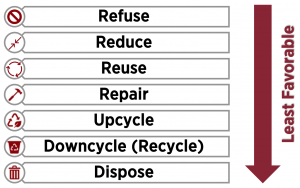FOOD SERVICE ITEMS
Adapted from Princeton University’s Sustainable Event Guidelines
- Choose reusable items (e.g., dishes, glasses, cutlery, etc.) whenever possible, and remember to ask your caterer not to include disposable items. Some options:
- Ask for reusable items which can be picked up or returned after the event, and/or
- Have your club, organization, or overseeing department buy reusable items, which can be your own or shared with other event holders, and/or
- Host events in spaces with reusable items or ask your volunteers to assist in reduced waste clean-up.
- Consider refusing the single use serving utensils that are delivered with the catered food. Plan ahead and bring reusable utensils to use instead of producing unnecessary waste.
- Some materials have natural antimicrobial properties (e.g., bamboo)
- Wash out aluminum catering dishes before recycling them; they cannot be recycled if they are food soiled.
- Consider food options that don’t require utensils (e.g., pizza, sandwiches, etc.)
- If this is not possible, encourage attendees to bring their own utensils (forks, knives, etc.)
- Order platters instead of individually packaged items and order in bulk when possible.
- If single-use items are absolutely necessary, ask or request that your caterer use items made of recycled or renewable materials. If they are unresponsive to this request or cannot offer it, consider seeking out caterers who can.
- Educate attendees on what is recyclable versus what is compostable; this is key for productive waste diversion.
- Order more sustainable single-use food service ware with reference to the Center for Environmental Health’s Database of Single-Use Food Service Ware Products Tested for Fluorinated Additives
Coming Soon
Have Kitchen spaces with a dishwasher and reusable plates/utensils:
- The Lodge at the CPA’s
Have kitchen spaces with sinks (could be used to wash plates, etc.):
- The Lodge at the CPA’s
- Laurel Hall Kitchen
 Adapted from “Reuse for Good” by the Post-Landfill Action Network2
Adapted from “Reuse for Good” by the Post-Landfill Action Network2
Follow Ramapo Green